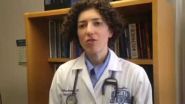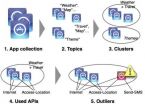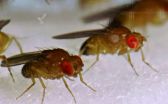(Press-News.org) VIDEO:
Discrimination against transgender people -- as many as one million Americans identify themselves as transgender -- should immediately be addressed by the medical establishment, backed by policy change at the...
Click here for more information.
DETROIT – Discrimination against transgender people –as many as one million Americans identify themselves as transgender – should immediately be addressed by the medical establishment, backed by policy change at the national level to provide equal access to quality health care.
That is the primary recommendation of a study by Daphna Stroumsa, M.D., MPH, an obstetrics and gynecology resident at Henry Ford Hospital, whose research was recently published online ahead of print in the American Journal of Public Health.
"Bias against transgender people takes an enormous toll on their health through direct harm, lack of appropriate care and a hostile environment, and through transgender people's avoidance of the medical system as a result of discrimination and lack of respect," Dr. Stroumsa says. "The medical establishment has a duty, and an ability, to protect transgender patients from such harms."
A top priority, she recommends, is that all health care programs funded by the federal government be required to provide coverage of care – including sex reassignment surgery – while transgender patients make the physical transition to the sex matching their gender identity.
These should include the U.S. Department of Veterans Affairs, Medicaid and Medicare, and Children's Health Insurance Program – also known as Children's Medicaid.
"Private insurance may ultimately follow adoption of full coverage by federally funded programs," Dr. Stroumsa writes. "But until it does, federal guidelines protecting transgender people from discrimination by private insurance companies is warranted, including a ban on the practice of denying medical care coverage by linking the care to transition, which is not covered under most policies."
While the Affordable Care Act (ACA) includes gender identity in its nondiscrimination clause, to what extent it will protect transgender people from denial of coverage remains to be seen, she adds.
The ACA increases the number of people who will have access to basic health care. Because of work-related and other discrimination, transgender people are statistically more likely to find themselves without coverage and thus stand to benefit from the general increase in access to health care that the ACA provides.
As part of its duty to provide appropriate, quality care, the medical establishment should include transgender-sensitive care in all medical education "as has been done with other cultural competencies."
To back this up, Dr. Stroumsa calls for federal grants to help fund educational programs teaching postgraduate-level medical care of transgender patients, including sex reassignment surgery. She notes that the ACA "has taken a first positive step in that direction" by providing funding for LGBT (lesbian, gay, bisexual and transgender) cultural competency training. Such training has already been implemented in some "big-city" health departments, and is underway for staff of the National Health Service Corps.
Among the study's other recommendations:
Establish more health centers dedicated to caring for transgender patients as well as strengthen those already in operation.
Draft clear guidelines for all federally funded health centers, including appropriate language, adoption of gender-neutral bathrooms and health records that respect transgender patients' preferred names and gender pronouns.
Include questions regarding gender identity in health surveys to help monitor the progress and effects of new transgender health care measures.
Help overcome the high rates of unemployment in the transgender population by hiring transgender people in the health care workforce. This would also offer an important avenue to address some of the challenges and barriers this population faces in the health care system.
A final recommendation of the study is that those who care for transgender patients should collect and publish data with the goal of improving that care.
"It goes without saying that all such research must be conducted with sensitivity and respect toward participants," Dr. Stroumsa concludes.
INFORMATION:For copy of the study, please send an email to Dwight Angell at Dwight.Angell@hfhs.org
Transgender patients discriminated against for health care services
2014-02-18
ELSE PRESS RELEASES FROM THIS DATE:
Frequent school moves can increase the risk of psychotic symptoms in early adolescence
2014-02-18
Researchers at Warwick Medical School have shown that frequently moving schools during childhood can increase the risk of psychotic symptoms in later years.
The study, published in the Journal of American Academy of Child and Adolescent Psychiatry, found that school mobility during childhood heightens the risk of developing psychotic-like symptoms in early adolescence by up to 60%.
Suffering from psychotic-like symptoms at young age is strongly associated with mental health problems in adulthood, including psychotic disorders and suicide.
Professor Swaran Singh, ...
Wisdom of app stores: Early identification of malicious Android apps from Google Play
2014-02-18
"How do I know that the new installed app behaves as described?" asks Andreas Zeller, professor of software engineering at Saarland University. So far experts have identified so-called malicious apps by checking their behavior against patterns of known attacks. "But what if the attack is brand-new?" asks Zeller.
His group seems to have found a new method to answer all these questions. Zeller summarizes the basic idea as follows: "Apps whose functionality is described in the app store should behave accordingly. If that is not the case, they are suspect."
His research ...
Do Guam mantas plan moon parties?
2014-02-18
Several of Hartup's paddler and free diving friends told her about seeing mantas congregating purposefully in an area where surgeonfish were spawning. Since they were able to give her an exact date, Julie was able to calculate the moon phase, which is important as many fish synchronize their spawning with the moon. Using this information she predicted when the spawning event would occur that upcoming year and was there to witness a shoal of spawning surgeonfish accompanied by a fever of mantas.
Hartup's research findings not only highlight important information about ...
Environmental issues examined through cohesive efforts
2014-02-18
CHICAGO – Solving crucial environmental issues such as global warming and water supply involves managing competing interests, uncertainty and risk, and this is best done through meaningful collaboration in a neutral environment.
Arizona State University Barrett Honors College Lecturer John N. Parker discussed the ways in which scientists, stakeholders and policy makers can communicate effectively by coming together through boundary organizations at the annual meeting of the American Association for the Advancement of Science in Chicago.
Boundary organizations are ...
NUS researchers make new discovery of protein as a promising target for treatment of ATC
2014-02-18
Anaplastic thyroid carcinoma (ATC) is an aggressive type of cancer with a poor prognosis for which there is currently no effective treatment. Researchers from the National University of Singapore (NUS) have discovered for the first time that an epithelial basement membrane protein, called laminin-5 gamma-2 (LAMC2), has the potential to be an ideal target for the treatment of ATC.
Led by Professor H. Phillip Koeffler, Senior Principal Investigator, and Dr Manoj Garg, Research Fellow, at the Cancer Science Institute of Singapore (CSI Singapore) at NUS, the team is also ...
KAIST developed low-powered, high-speed head-mounted display with augment reality chip
2014-02-18
Daejeon, Republic of Korea, February 17, 2014 – Walking around the streets searching for a place to eat will be no hassle when a head-mounted display (HMD) becomes affordable and ubiquitous. Researchers at the Korea Advanced Institute of Science and Technology (KAIST) developed K-Glass, a wearable, hands-free HMD that enables users to find restaurants while checking out their menus. If the user of K-Glass walks up to a restaurant and looks at the name of the restaurant, today's menu and a 3D image of food pop up. The Glass can even show the number of tables available inside ...
Gender and genes play an important role in delayed language development
2014-02-18
Boys are at greater risk for delayed language development than girls, according to a new study using data from the Norwegian Mother and Child Cohort Study. The researchers also found that reading and writing difficulties in the family gave an increased risk.
"We show for the first time that reading and writing difficulties in the family can be the main reason why a child has a speech delay that first begins between three to five years of age," says Eivind Ystrøm, senior researcher at the Norwegian Institute of Public Health.
Ystrøm was supervisor of Imac Maria Zambrana, ...
Researchers identify new way to control stone fruit disease
2014-02-18
Researchers at the University of Kent and East Malling Research have identified a new way of controlling a fungal disease that can have a devastating impact on the UK's valuable cherry and plum crops.
Brown rot disease – caused by the agent Monilinia laxa – attacks stone fruit as well as causing blossom wilt and twig canker. Traditionally, this has been controlled through the use of fungicide treatments, but in some cases these are now becoming ineffective.
Now researchers from the two organisations have identified a new strategy for controlling the disease, using biological ...
In search of lost genes
2014-02-18
How do new genes arise? Current research shows that so-called "orphan genes" may appear as if by magic as a result of mutations in segments of DNA that previously had no function. Orphan genes were first discovered in the fruit fly but are found in all organisms, including man. Strikingly, up to 30 per cent of the total number of genes in an organism may be orphans and these genes may rapidly acquire functions. Scientists from the Institute of Population Genetics of the University of Veterinary Medicine, Vienna (Vetmeduni) have now investigated the fate of orphan genes. ...
HIV drug used to reverse effects of virus that causes cervical cancer
2014-02-18
A commonly-used HIV drug has been shown to kill-off the human papilloma virus (HPV) that leads to cervical cancer in a world-first clinical trial led by The University of Manchester with Kenyatta National Hospital (KNH) in Nairobi.
Drs Ian and Lynne Hampson, from the University's Institute of Cancer Sciences and Dr Innocent Orora Maranga, Consultant in Obstetrics and Gynaecology at KNH in Nairobi examined Kenyan women diagnosed with HPV positive early stage cervical cancer who were treated with the antiviral HIV drug lopinavir in Kenya.
The study looked at 40 women ...





